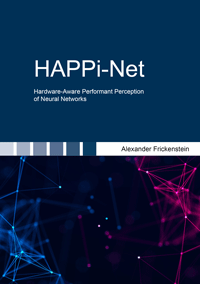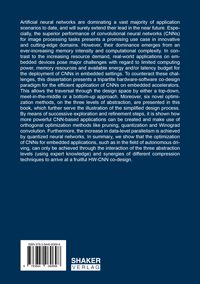
Shop : Details
Shop
Details
48,80 €ISBN 978-3-8440-8069-8Softcover180 pages53 figures266 g21 x 14,8 cmEnglishThesis
June 2021
Alexander Frickenstein
HAPPi-Net
Hardware-Aware Performant Perception of Neural Networks
Artificial neural networks are dominating a vast majority of application scenarios to date, and will surely extend their lead in the near future. Especially, the superior performance of convolutional neural networks (CNNs) for image processing tasks presents a promising use case in innovative and cutting-edge domains. However, their dominance emerges from an ever-increasing memory intensity and computational complexity. In contrast to the increasing resource demand, real-world applications on embedded devices pose major challenges with regard to limited computing power, memory resources and available energy and/or latency budget for the deployment of CNNs in embedded settings. To counteract these challenges, this dissertation presents a tripartite hardware-software co-design paradigm for the efficient application of CNNs on embedded accelerators. This allows the traversal through the design space by either a top-down, meet-in-the-middle or a bottom-up approach. Moreover, six novel optimization methods, on the three levels of abstraction, are presented in this book, which further serve the illustration of the simplified design process. By means of successive exploration and refinement steps, it is shown how more powerful CNN-based applications can be created and make use of orthogonal optimization methods like pruning, quantization and Winograd convolution. Furthermore, the increase in data-level parallelism is achieved by quantized neural networks. In summary, we show that the optimization of CNNs for embedded applications, such as in the field of autonomous driving, can only be achieved through the interaction of the three abstraction levels (using expert knowledge) and synergies of different compression techniques to arrive at a fruitful HW-CNN co-design.
Keywords: HW-CCN Co-Design; Neural Network; HAPPi-Net
Available online documents for this title
DOI 10.2370/9783844080698
You need Adobe Reader, to view these files. Here you will find a little help and information for downloading the PDF files.
Please note that the online documents cannot be printed or edited.
Please also see further information at: Help and Information.
Please also see further information at: Help and Information.
| Document |  | Document | ||
| Type |  | |||
| Costs |  | 36,60 € | ||
| Action |  | Purchase in obligation and download the file | ||
| Document |  | Table of contents | ||
| Type |  | |||
| Costs |  | free | ||
| Action |  | Download the file | ||
User settings for registered online customers (online documents)
You can change your address details here and access documents you have already ordered.
User
Not logged in
Export of bibliographic data
Shaker Verlag GmbH
Am Langen Graben 15a
52353 Düren
Germany
Am Langen Graben 15a
52353 Düren
Germany
Mon. - Thurs. 8:00 a.m. to 4:00 p.m.
Fri. 8:00 a.m. to 3:00 p.m.
Fri. 8:00 a.m. to 3:00 p.m.
Contact us. We will be happy to help you.



